Four-year old Israel, born in Russellville, Ky., held his mother’s hand and squeezed hard. His family had just heard the drop of the wooden mallet sealing their purchase by a Methodist couple from Ohio. This gifted child, born into slavery, grew to become a strong Christian young man, dedicated to Christ and his church, and he impacted Baptist life in Texas like no other.
Following his conversion, Israel Sydney Campbell (1815-1898) became a Baptist as a 21-year-old and answered God’s call to preach the next year, even though he still was a slave. Despite great trials, hardships and beatings, he was pastor of churches in Tennessee, Canada and Ohio before his ordination in 1855 at age 40. He then became a missionary in Louisiana and Texas, arriving in the Lone Star State as other missionaries also were arriving to minister here.
Galveston’s Avenue L Missionary Baptist Church
Most of the first Baptists to set foot in Texas came by ship in those days, docking at Galveston Island and trekking inland from the Gulf of Mexico. American Home Missionary James Huckins, William Tryon, George Washington Baines and Robert Emmett Bledsoe Baylor were among these first Baptists to arrive. In 1840, Huckins helped organize First Baptist Church in Galveston the same year several black Baptists first became a part of that church family. Huckins then aided black Baptists in the growing city to organize their own church, the Colored Baptist Church of Galveston, 20 years before the Civil War. This congregation met in the courthouse several years; it was a safe place where slaves could gather to worship and learn to read and write. In 1855, it changed its name to African Baptist Church, but the Civil War began to disrupt services more often than not.
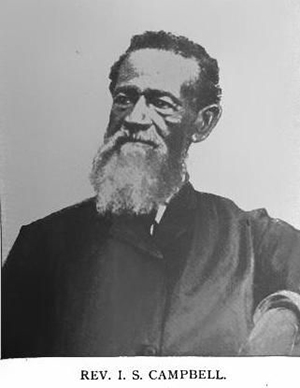 After emancipation and the war’s end, when Gail Borden Jr. and other Baptist brothers bought and deeded land to the African Baptist Church, Israel Campbell and a fellow pastor, I. Rhinehart, went to work. In 1867, Campbell reorganized the straggling membership into a new congregation, called First Regular Missionary Baptist Church, and relocated it to 26th Street and Avenue L. This was the first entirely independent black Baptist church organized in Texas following the 1863 emancipation. It soon grew under Campbell’s leadership to more than 500 members.
After emancipation and the war’s end, when Gail Borden Jr. and other Baptist brothers bought and deeded land to the African Baptist Church, Israel Campbell and a fellow pastor, I. Rhinehart, went to work. In 1867, Campbell reorganized the straggling membership into a new congregation, called First Regular Missionary Baptist Church, and relocated it to 26th Street and Avenue L. This was the first entirely independent black Baptist church organized in Texas following the 1863 emancipation. It soon grew under Campbell’s leadership to more than 500 members.
In 1868, Campbell, along with Baptist pastor friends John Henry “Jack” Yates and Peter Diggs, organized the first association of black Baptists in Texas, called the Lincoln District Baptist Association. In 1872, they founded the Baptist State Missionary and Education Convention. Financially supported by the American Baptist Home Mission Society of New York, this convention was the first statewide black Baptist organization in Texas. With Campbell as one of its primary leaders, the convention became a success, and, by 1890, the churches of the convention had a membership of more than 110,000. (By 1916, 72 percent of the state’s black churchgoers were Baptists.)
In February 1891, at age 76, and after dedicating a new sanctuary built that year, Campbell retired as pastor of First Regular Missionary Baptist Church. The “Father of Black Baptists in Texas” died in La Marque on June 13, 1898, and was buried in Lakeview Cemetery in Galveston.
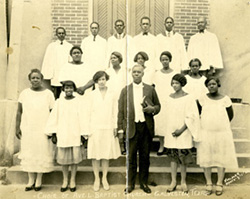 A choir from Avenue L Missionary Baptist Church is pictured in this photo from 1926.When the devastating hurricane of 1900 pounded most of the island’s buildings into the ocean, the congregation lost its church home. However, by 1904, the congregation built a new wooden sanctuary and renamed the church, “Avenue L Missionary Baptist Church.” In 1916, the African-American firm of Tanner Brothers Contractors and Architects constructed a red-brick sanctuary on the site, which still stands today at Avenue L, along with the 1904 structure on its west side.
A choir from Avenue L Missionary Baptist Church is pictured in this photo from 1926.When the devastating hurricane of 1900 pounded most of the island’s buildings into the ocean, the congregation lost its church home. However, by 1904, the congregation built a new wooden sanctuary and renamed the church, “Avenue L Missionary Baptist Church.” In 1916, the African-American firm of Tanner Brothers Contractors and Architects constructed a red-brick sanctuary on the site, which still stands today at Avenue L, along with the 1904 structure on its west side.
For 149 years, this church has been a faithful witness for Christ in Galveston, ministering to the community and training disciples, guided by the motto: “See a need. Meet a need.” Many of its members are multi-generational descendants of the church’s founders, who worship today with people from many ethnic backgrounds.
Sign up for our weekly edition and get all our headlines in your inbox on Thursdays
Houston’s Antioch Baptist Church
Just north of Galveston was a new township called Houston, which was on the verge of exploding with growth. Huckins had organized a Baptist church there in 1841, and much already had been accomplished. In January 1866, after the Civil War ended, Campbell and his friend Rhinehart spent a year working with newly freed believers in Houston. They organized Antioch Baptist Church with 12 newly emancipated freedmen and women, and Campbell served as interim pastor. Although Antioch received support from the First Baptist and German Baptist churches, Campbell guided the congregation to move to a separate location from the rest of First Baptist Church—to a “brush-arbor” on the edge of Buffalo Bayou.
When Campbell preached a series of revival meetings in 1867, 170 new members became part of the church and built a box-house structure at “Old Baptist Hill,” on the corner of Rusk and Bagby streets. Campbell and Rhinehart participated in the ordination of John Henry Yates. Campbell left Houston and moved to Galveston. Yates became the first full-time pastor of Antioch.
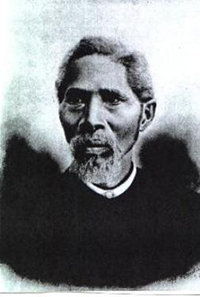 John Henry “Jack” Yates John Henry “Jack” Yates (1828-1897) was born a slave in Glouster County, Va., and arrived in Matagorda County, Texas, sometime during 1863 or 1864. After receiving his freedom, he settled his family in Houston. During his tenure as pastor, the membership of Antioch increased more than four-fold. The box house no longer was able to accommodate the congregation adequately. In 1875, members of the congregation laid a cornerstone for a new structure, made and laid the bricks and, four years later, the congregation marched from “Old Baptist Hill” to the new brick church on Robin Street. Located in the center of Freedmen’s Town, the church was the first brick structure in Houston built and owned by African-Americans.
John Henry “Jack” Yates John Henry “Jack” Yates (1828-1897) was born a slave in Glouster County, Va., and arrived in Matagorda County, Texas, sometime during 1863 or 1864. After receiving his freedom, he settled his family in Houston. During his tenure as pastor, the membership of Antioch increased more than four-fold. The box house no longer was able to accommodate the congregation adequately. In 1875, members of the congregation laid a cornerstone for a new structure, made and laid the bricks and, four years later, the congregation marched from “Old Baptist Hill” to the new brick church on Robin Street. Located in the center of Freedmen’s Town, the church was the first brick structure in Houston built and owned by African-Americans.
I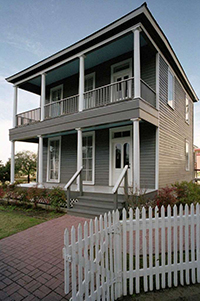 Jack Yates’ house that once stood on Andrews Street is now a museum in Sam Houston Park in Freedmen’s Town in Houston’s Fourth Ward.n 1872, Yates led his congregation to join other former slaves from the Trinity Episcopal Methodist Church to purchase land at Dowling and Elgin streets to found Emancipation Park as a place for blacks to celebrate Juneteenth, the state holiday that marks the 1865 announcement in Texas that legalized slavery had come to an end. This was the first public park in Houston. In 1885, Yates, along with white brothers and sisters, founded Houston Baptist Academy (Houston College for Negroes and now Texas Southern University) and articulated, along with Campbell, the vision for Bishop College, founded in 1881. Jack Yates High School, in Houston’s Third Ward, was named in his honor in 1926, and his two-story house that once stood on Andrews Street is now a museum in Sam Houston Park in Freedmen’s Town in Houston’s Fourth Ward.
Jack Yates’ house that once stood on Andrews Street is now a museum in Sam Houston Park in Freedmen’s Town in Houston’s Fourth Ward.n 1872, Yates led his congregation to join other former slaves from the Trinity Episcopal Methodist Church to purchase land at Dowling and Elgin streets to found Emancipation Park as a place for blacks to celebrate Juneteenth, the state holiday that marks the 1865 announcement in Texas that legalized slavery had come to an end. This was the first public park in Houston. In 1885, Yates, along with white brothers and sisters, founded Houston Baptist Academy (Houston College for Negroes and now Texas Southern University) and articulated, along with Campbell, the vision for Bishop College, founded in 1881. Jack Yates High School, in Houston’s Third Ward, was named in his honor in 1926, and his two-story house that once stood on Andrews Street is now a museum in Sam Houston Park in Freedmen’s Town in Houston’s Fourth Ward.
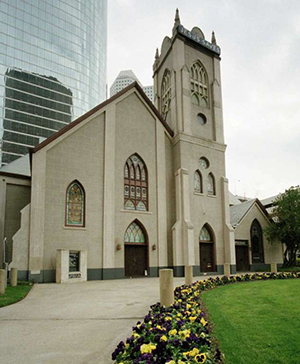 Antioch Misisonary Baptist Church in Houston Through the years and still today, amidst the skyscrapers of Houston, Antioch Missionary Baptist Church continues to serve the needs of her people and community, proudly proclaiming the message: Jesus Saves. Today’s members still worship in the sanctuary’s original handmade pews. They enter to worship and leave to serve their communities with the gospel of Christ in word and actions.
Antioch Misisonary Baptist Church in Houston Through the years and still today, amidst the skyscrapers of Houston, Antioch Missionary Baptist Church continues to serve the needs of her people and community, proudly proclaiming the message: Jesus Saves. Today’s members still worship in the sanctuary’s original handmade pews. They enter to worship and leave to serve their communities with the gospel of Christ in word and actions.
The legacies of Israel Campbell and Jack Yates are found today in the lives of Texas Baptists who minister with vision, courage, endurance and grace in urban settings and cross-cultural and inter-racial contexts.
Visit Avenue L Missionary Baptist Church, 2612 Avenue L, Galveston, TX 77550; Phone (409) 762-8795
Visit Antioch Missionary Baptist Church, 500 Clay Street, Houston, TX 77002; Phone (713) 652-0738
For More Information and Sites to Explore:
- Visit Lakeview Cemetery, site of Israel Campbell’s grave, at: 3015 57th St., Galveston, TX 77551
- For many wonderful sites in Galveston, study the African American Guidebook to Historical Sites, including the founding Emancipation Proclamation location, here. Note the many churches in Galveston that are more than 100 years old and whose origins are connected to Avenue L Missionary Baptist Church.
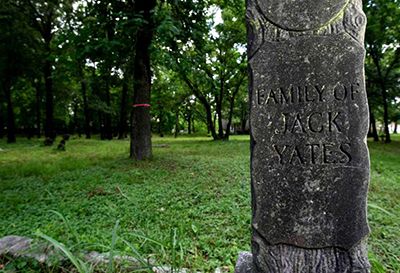 To learn more about Yates, visit the state historical marker that enshrines his gravesite at the College Memorial Park Cemetery near the old site of the Freedmen’s Town community, 3525 West Dallas, Houston, TX 77019.
To learn more about Yates, visit the state historical marker that enshrines his gravesite at the College Memorial Park Cemetery near the old site of the Freedmen’s Town community, 3525 West Dallas, Houston, TX 77019.- Visit Emancipation Park, 3018 Dowling St., Houston, TX 77004; Phone (832) 395-7000
- Visit the home of Yates in Sam Houston Park, 1000 Bagby St., Houston, TX 77002; Phone (832) 395-7000. For more information, click here and here.
















We seek to connect God’s story and God’s people around the world. To learn more about God’s story, click here.
Send comments and feedback to Eric Black, our editor. For comments to be published, please specify “letter to the editor.” Maximum length for publication is 300 words.